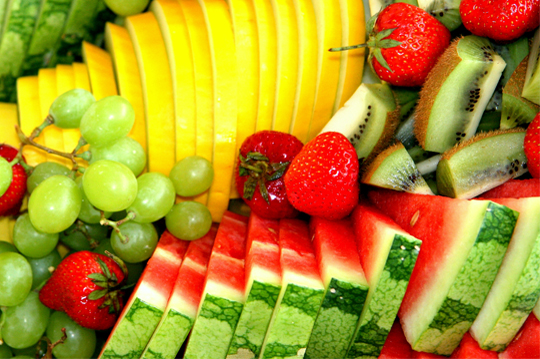
Reducing Food Waste in Foodservice
October 16, 2018 by Doreen Garelick, Dietetic Intern
Our intern Doreen attended a food waste summit for restaurants and compiled these tips to help food service operators redirect…
Nutrition 101, SPE Certified's Perfect Pantry
March 27, 2013

Senior Culinary Nutritionist Andrea Canada shares her advice on which fruits and vegetables you'll want to keep on hand this season.
Spring is finally here and while it may not feel like it yet, farmer’s markets will soon be flush with the colors of spring and summer. Fruits and vegetables are generally low in calories and high in a wide variety of vitamins, minerals and phytochemicals, so are an essential component of a healthful diet.
It’s always good to have staples such as lemons, garlic, onions, celery and carrots in your kitchen for cooking. Fruits and veggies always make good snacks, so if you keep your kitchen stocked, it makes it easy to grab something healthy! Dried fruits such as prunes, cherries, raisins, apple rings, apricots and figs can make healthy snacks when eaten in moderation, but be sure to look for those with no added sugar.
Fresh fruits like berries and cherries are tastiest and most nutritious (not to mention cheapest!) when they’re in season, so buy them in bulk and freeze them for smoothies or desserts (freeze them in a single layer on a baking sheet and store in freezer bags).
So that all those fruits and veggies don’t go bad in your fridge, here’s a list of where to store different fruits and vegetables in your kitchen so that they stay fresh as long as possible:
Adapted from the NYC Department of Health and Mental Hygiene’s Eat Street Smart guide, available at http://www.nyc.gov/html/doh/downloads/pdf/cdp/greencarts-brochure-online.pdf.

October 16, 2018 by Doreen Garelick, Dietetic Intern
Our intern Doreen attended a food waste summit for restaurants and compiled these tips to help food service operators redirect food waste from landfills.
Nutrition 101

Nutrition 101
September 26, 2018 by Doreen Garelick, Dietetic Intern
Ever notice headlines about rapid weightloss? Dietetic Intern Doreen Garelick looks deeper into a recent eye-catching headline to see if there's any truth behind it.
Connect
 Follow us on Twitter
Follow us on Twitter Friend us on Facebook
Friend us on Facebook Follow us on Pinterest
Follow us on Pinterest Follow us on Instagram
Follow us on Instagram Read our Blog
Read our Blog Watch videos on YouTube
Watch videos on YouTube Watch videos on Vimeo
Watch videos on Vimeo Connect with us on Linkedin
Connect with us on Linkedin Find us on Foursquare
Find us on Foursquare
Tweets by @SPEcertifiedBlog Search
Categories
SPE Certified Newsletter
Sign up for news on the latest SPE-certified venues, events and SPE updates.
We will never share your personal information with a third party.